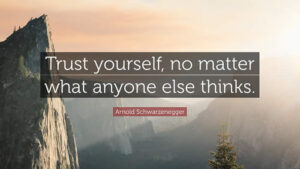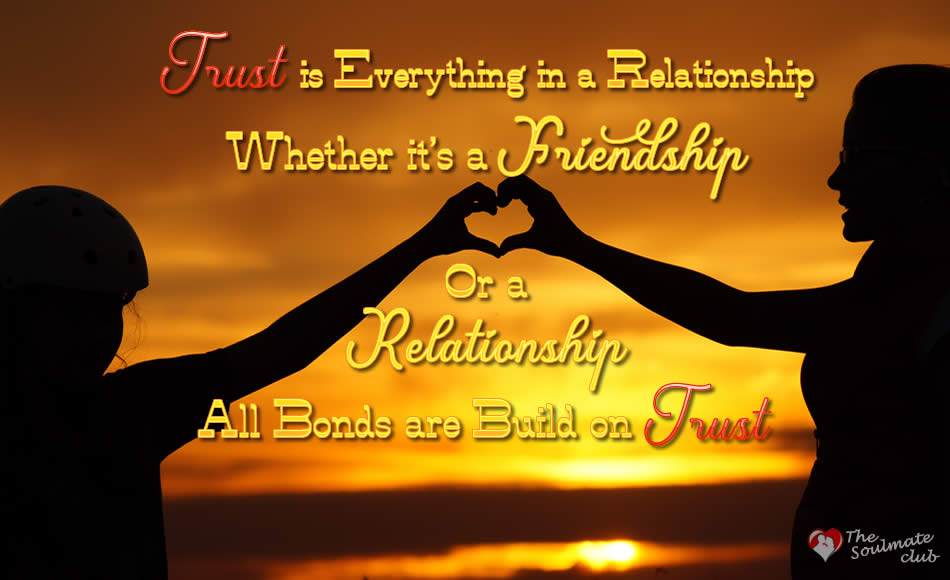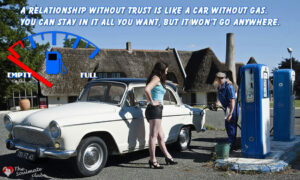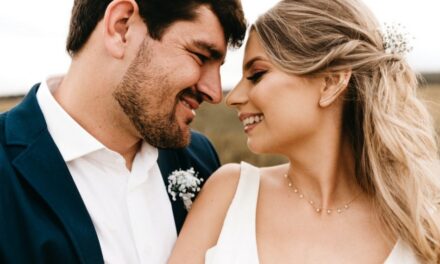Most basically, the whole world is built around our ability to trust others.
When we drive a car, we trust other drivers to stay in their lanes. We trust people who drive to follow the law. When you see a car swerve slightly, or if it’s a late-night on a holiday, you might wonder if someone is driving intoxicated. But overall, if you didn’t trust the process, chances are you wouldn’t risk your life by driving at all.
We all have our own handful of beliefs about trust. We may wonder if we should trust someone from the start until they give us a reason not to, or if it’s better to hold back until our trust has been earned.
In relationships, it can be hard to choose which way to go. If you hold back trust, you send a message that you aren’t willing to open up in the relationship, but if you give trust blindly without really knowing who a person is before doing so, there’s a good chance of getting hurt.
However, trust is one of the cornerstones of any relationship, as without it two people cannot be comfortable with each other and the relationship will lack stability.
Basically, trust lets us feel secure because we believe our partner has our back and will be loyal through thick and thin. It also allows us to display our thoughts and feelings openly and honestly because we regard our partner as supportive and don’t worry that they will judge, ridicule, or reject us. Trust goes hand in hand with commitment; it’s only after you feel that you can trust someone that you are able to truly commit to that person.
Trust builds slowly as we learn about our partner and they become predictable to us. Predictability is important because having an idea of what will happen makes us feel in control of our lives. As we observe how our partner thinks and acts in a given situation, we develop a sense as to how they will most likely think and act in future situations. If they appear to be consistent and to have our best interests at heart, we can believe they will continue to do so in the future; thus, we can trust them.
There is an element of faith operating with trust, because we can never truly know what our partner might do or say before the fact. Having faith in your partner—meaning you believe they will do right by you before they do it—is considered to be a strong indicator of a trusting relationship.
The sense of security and predictability that comes with trust makes us feel good about our partner and believe our relationship has long-term potential. These positive thoughts help to keep our emotions on an even keel. When emotions are under control, they don’t get the better of us. The sense of security and predictability that comes with trust makes us feel good about our partner and believe our relationship has long-term potential. These positive thoughts help to keep emotions on an even keel. When emotions are under control, they don’t get the better of us.
Thus, we’re able to discuss problems openly and with little (or no) hostility, and have an easier time coming to solutions. We’re also able to keep conflicts in perspective and not use any single event to judge the overall quality of our relationship. Additionally, it’s easier to forgive most indiscretions because we don’t believe our partner would intentionally hurt us.
Thus, we’re able to discuss problems openly and with little (or no) hostility, and have an easier time coming to solutions. We’re also able to keep conflicts in perspective and not use any single event to judge the overall quality of our relationship. Additionally, it’s easier to forgive most indiscretions because we don’t believe our partner would intentionally hurt us.
As slow as trust is to build, it can dissolve just as quickly—sometimes, from a single indiscretion. If that event is extreme, such as infidelity, trust can be very difficult to re-establish; that will, in most cases, undermine other aspects of a marriage.
One of the main casualties is often communication. Because we can’t be sure of our partner’s motives or have an idea of what they’re thinking, we can have trouble talking to them openly and honestly. It’s not possible to work through issues if you can’t believe what your partner is saying. This often means we avoid discussing problems altogether, especially because they’ve often become so emotionally charged that we can only react with anger and hostility.
We might also feel we have to be very careful in choosing our words, because we can’t be sure how our partner might react to what we say. Under such conditions, it’s not surprising that couples with trust issues argue much more frequently, that their disagreements have a more negative tone, and that they’re rarely able to come to resolutions.
Partners who don’t trust can’t feel secure; thus, their relationship will cycle through frequent emotional highs and lows because a mistrusting partner spends much of their time scrutinizing their relationship and trying to understand their partner’s motives. When the other’s words or actions seem trustworthy or positive, the questioning partner feels happy and has hope for the relationship. But when some untrustworthy or negative event happens, it serves as evidence that the relationship has problems.
Furthermore, when we don’t trust our partner, we’re prone to exaggerate their negative behavior and discount their positive behavior. Because the positives have much less weight than the negatives, we’re much more likely to constantly question the worth of the relationship.
While a breakdown in trust is sometimes a result of actual indiscretions by one or both spouses, that’s not always the case. Some people, for various reasons, have trouble trusting anyone; these individuals may not trust their partner regardless of whether or not that person is, in fact, trustworthy.
People with trust issues often employ certain patterns of thinking and acting that make all types of relationships difficult for them. They tend to be critical of others, interpret situations in a cynical or negative light, and are less willing to give people the benefit of the doubt. Interestingly, low-trust people are themselves more prone to lie and cheat than are trusting people. It’s possible they justify such behavior because they believe others are doing the same thing to them.
Low-trust people bring to their marriages the same problems that are found among couples in which one partner truly cannot be trusted. They have trouble communicating, constantly question their partner’s motives, and allow their feelings of mistrust to cloud their overall perceptions of their partner and their relationship.
Furthermore, because they tend to be highly critical, they will likely look upon what their partners say and do with much less tolerance than would a trusting person. They might also regard their partner’s questionable words and deeds as personally threatening; this tendency can cause them to overreact to minor indiscretions. As a consequence, small problems can have a bigger impact than they normally would (or should).
Someone who is married to a low-trust person will likely find their relationship to be exasperating. They might feel constant pressure to make sure they come across as honest and trustworthy. Such scrutiny may mean they have to spend more effort than should be necessary justifying themselves. They might also think there’s a “Kafkaesque” quality to their relationship: They feel punished or criticized for no reason, yet guilty and powerless to fix a problem that really doesn’t exist.
Along with feeling frustrated—and possibly resentful—they’re likely to feel insecure about themselves and their relationship. As a result, they’re likely to find it difficult to stay personally connected to their partner.
Unfortunately, there’s not much advice to be offered if your partner truly can’t be trusted. You can try to discuss the issue, but that’s not likely to lead to a meaningful solution. If they’re really untrustworthy, how can you believe their promise not to be?
The hard truth is that a relationship without trust cannot flourish over the long term. It’s extremely difficult to disregard or de-emphasize such a flaw in your partner; its very existence will leave you feeling insecure about your relationship. That, in turn, makes it hard to feel emotionally connected.
However, if your mistrust is more perceived than real, or is based upon very minor transgressions that should be overlooked, then the issue comes down to your perspective—and that’s something that can be fixed.
If you believe all or most people are untrustworthy or dishonest, or you often feel suspicious about other people’s motives, then you might want to consider that your inability to trust your partner stems from a broader personal problem. Individual therapy can be very effective in developing strategies that will help you cope with mistrust.
Keep in mind that learning to trust is certainly worth the effort. Not only will it improve a marriage, but it will help you in other relationships and can improve your overall psychological well-being.
Here are some Trust Quotes to Remind Us what is REALLY Important.
- “Always trust your gut. It knows what your head hasn’t figured out yet.”
- “Self-trust is the first secret of success.” — Ralph Waldo Emerson
- “Trust what you love, continue to do it and it will take you where you need to go.” — Natalie Goldberg
- “When you can’t believe your eyes, you can always trust your heart. Love makes anything possible.”
- “Whether it’s friendship or relationship, all bonds are built on trust. Without it, you have nothing.”
- “Without trust, it’s only a matter of time before relationships crumble.”
- “In a relationship, trust is more important than love. It will enhance your love.”
- “Trust is one of the most important things in a relationship. It won’t work if you don’t trust each other.”
- “I trust you” is better than “I love you” because you may not always trust the person you love but you can always love the person you trust.”
- “The best proof of love is trust.”
- “When you completely trust a person without any doubt, you’ll automatically receive one of two things — a friend for life or a lesson for life.”
- “People are my most important asset. Faith in the supreme being, trust, credibility, and performance are the things that have brought me to the top.” — Don King
- “Great people have great values and great ethics.” — Jeffrey Gitomer
- “Friendship is built on two things. Respect and trust. Both elements have to be there, and they have to be mutual. You can have respect for someone, but if you don’t have trust, the friendship will crumble.”
- “Wisdom is found only in truth.” — Johann Wolfgang von Goethe
- “It’s so important to reach out to people you trust, and who can give you honest feedback, and keep those people close to you. You don’t want to surround yourself with enablers.” — Tim Gunn
- “If you want to do really important things in life and big things in life, you can’t do anything by yourself. And your best teams are your friends and your siblings.” — Deepak Chopra
- “Honesty is the first chapter in the book of wisdom.” — Buddha
- “Sometimes all you need is twenty seconds of instant courage and I promise you something great will come of it.” — Benjamin Mee
- “How you make others feel about you says a lot about you.”
- “No individual can win a game by himself.” — Plato
- ” It takes courage to grow up and become who you really are.”
- “When the trust is high, communication is easy, instant, and effective.”
- “Communication + Trust = A relationship that will last a lifetime.”
- “Just trust yourself, then you will know how to live.” — Johann Wolfgang von Goethe
- “He who does not trust enough will not be trusted.” — Lao Tzu
- “You must trust and believe in people, or life becomes impossible.” — Anton Chekhov
- “Let go of the need to control the outcome. Trust the process. Trust your intuition. Trust yourself.”
- “Hold the vision. Trust the process.”
- “Trust your hunches. They’re usually based on facts.” — Dr. Joyce Brothers
- “Doubt kills more dreams than failure always will.” — Jane Foster
- “The best way to find out if you can trust somebody is to trust them.”– Ernest Hemingway
- “Fear leads to more fear, and trust leads to more trust.” –Dean Ornish
- “To be trusted is a greater compliment than being loved.” –George MacDonald
- “Trust in dreams, for in them is hidden the gate to eternity.” – Kahlil Gibran
The bottom line is that trust is something internal and personal to you, and all of us.
 Trust means “a firm belief in the reliability, truth, ability, or strength of someone or something.” When we trust someone, we have confidence in them and in their honesty and integrity. We believe that they will do the things they say they will. We recognize their abilities and strengths, and we place our faith in them.
Trust means “a firm belief in the reliability, truth, ability, or strength of someone or something.” When we trust someone, we have confidence in them and in their honesty and integrity. We believe that they will do the things they say they will. We recognize their abilities and strengths, and we place our faith in them.
No matter what, however, before you can really trust someone else in a relationship — whether a higher power or a human being…
…You Need to Trust Yourself, and Not Let Insecure Thoughts Ruin Something Amazing!
![]()



























